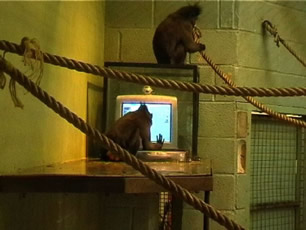
If an infinite number of monkeys are given typewriters for an infinite time, would they eventually produce the complete works of Shakespeare? Judging by the responses of some philosophers and mathematicians, the answer is yes. However, it was only in 2002 that a practical experiment was carried out to gain a real-world insight into the question.
Of course, the experiment did not involve an infinite number of monkeys – there were only six! And they shared one typewriter, or rather, a keyboard linked to a computer. When a key was struck, something happened on the screen, and this was reported as helping to sustain interest in the monkeys.
Paignton Zoo Environmental Park, Devon, was the scene for the project. The monkeys were Sulawesi Crested Macaques with the names Elmo, Gum, Heather, Holly, Mistletoe and Rowan. The computer was protected by a Perspex box with holes through which the keys could be touched. Part-funding was provided by the Arts Council of England (strictly speaking, this was a “performance” rather than an experiment).

Nevertheless, with six pages filled with letters, surely some words would be produced? With so many words to choose from, something recognisable might be expected to emerge. One problem was the lack of use of the space bar – strings of characters without spaces will never be meaningful. However, I did detect the letters “mass” hidden within one long string. Does this count as a positive result?
The most important lessons related to the concept of randomness. Most definitely, the letters were not typed randomly. According to Mike Phillips, who runs the Institute of Digital Arts and Technology at Plymouth University, “They pressed a lot of S’s. Obviously English isn’t their first language” (Yahoo News, 2003). Next in popularity were A, J, L and M. Randomness was notably absent.
The monkeys did not seem to enter into the spirit of the exercise. The lead male picked up a stone and started bashing the keyboard. All of the monkeys could be found sitting on the computer. “Another thing they were interested in was in defecating and urinating all over the keyboard” said Mike Phillips.
The web site reporting the exercise says: “The project is clearly not a scientific experiment, but hopefully does display some sense of integrity. Although it appears to test the truth of the formula, in reality it emphasises the unreliability of human (scientific) hypotheses. Animals are not simply metaphors for human endeavour.”
The origin of the typing monkeys metaphor goes back to Arthur Eddington’s Gifford Lectures of 1927.
“... If I let my fingers wander idly over the keys of a typewriter it might happen that my screed made an intelligible sentence. If an army of monkeys were strumming on typewriters they might write all the books in the British Museum.”
How this quote was embellished (or simplified!) to “reproduce the entire works of Shakespeare” has yet to be properly documented. Nevertheless, the metaphor has entered the popular mind and has certainly influenced generations of people. The message conveyed is that given enough time, any chance event is possible.
We can be thankful to the macaques of Paignton Zoo for reminding us that whilst “randomness” exists in the minds of mathematicians and philosophers, we must be very careful before thinking it actually exists anywhere else. Real world systems rarely conform exactly to our predetermined ideas and mathematical analysis. This is true of the roulette wheels of Monte Carlo as well as anything else that we like to think of as random.
The favoured application of the typewriter metaphor is the origin of life through chemical evolution. ‘Give a primordial soup enough time, and living reproducing cells will emerge’. However, the macaques’ performance should help us to see the flaws in this evolutionary story. Give a mixture of chemicals enough time, and it will reach … a state of equilibrium!
David J Tyler
Sources
Notes Towards the Complete Works of Shakespeare
Eddington, A.S. The Nature of the Physical World: The Gifford Lectures, 1927. Macmillan, New York. 1929, page 72.
Give six monkeys a computer, and what do you get? Certainly not the Bard, David Adam, The Guardian, Friday May 9, 2003
Typing Monkeys Don't Write Shakespeare By Jill Lawless, Yahoo News, May 9 2003
For a link to a computer simulation of typing monkeys, go here.
Graphic courtesy of www.vivaria.net

